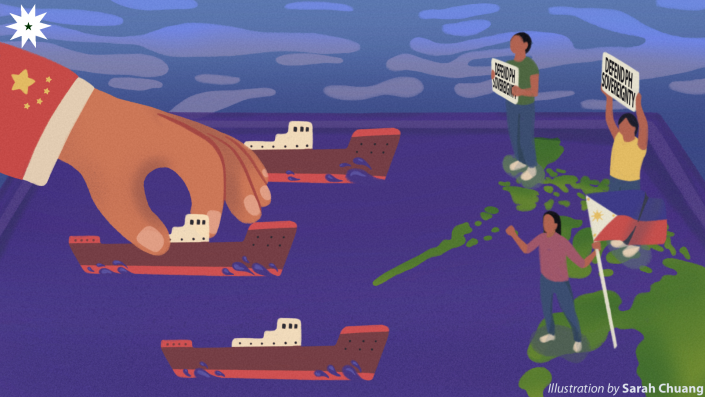Over the past few months, tensions in the West Philippine Sea (WPS) have escalated between the Philippines and China. The Department of Foreign Affairs (DFA) has since lodged a series of diplomatic protests calling out China’s encroachment in the area, which stemmed from the sighting of around 220 Chinese fishing vessels at the Julian Felipe Reef, a maritime domain within the Philippines’ Exclusive Economic Zone (EEZ).
As Chinese vessels have yet to vacate the EEZ in response to the DFA’s diplomatic actions, the incident has served as a reminder of growing Chinese aggression in the region. For the Philippines, President Rodrigo Duterte’s continued pursuit of friendlier relations with China continues to put the country’s independent foreign policy stance into question.

Duterte’s ‘pro-China’ stance
In July 2016, at the start of Duterte’s presidency, the Philippines won an international arbitration case against China over disputed territories in the South China Sea, a region that was renamed as the West Philippine Sea in 2012 through Administrative Order No. 29 under the Aquino administration.
Despite Duterte’s campaign promise to assert Philippine sovereign rights over the waters, the arbitration ruling had been put aside to improve relations with China in favor of the country receiving economic aid and investments.
On rare occasions, however, Duterte had opposed illegal Chinese activities in the disputed waters. For instance, last May 14, he refused to withdraw ships that patrolled the Kalayaan Islands and Mischief Reef after critics called his early campaign promise to plant a Philippine flag in the Spratlys a joke. The president reiterated, however, that the Philippines owed China a debt of gratitude for its donation of COVID-19 vaccines.
Dr. Dennis Coronacion, an assistant professor from the University of Santo Tomas Political Science Department, says that Duterte’s recent stand against Chinese territorial aggression was “short-lived” and that, throughout his time in office, the President has “made it clear that he wouldn’t want to antagonize China, especially when it comes to the South China Sea issue.”
“I think it has something to do with the upcoming election,” he reasons. “He was probably worrying at the time na baka makaapekto ‘yun sa kanyang popularity at sa magiging kandidato ng kanyang partido sa pagkapangulo.”
(He was probably worrying at the time that it might affect his popularity and his party’s future presidential candidate.)
Despite Duterte’s numerous statements rejecting the Philippines’ arbitration victory, the DFA continues to file diplomatic protests as part of the Department’s mandate to protect the country’s national interests, Coronacion shares.
Meanwhile, Dr. Alma Salvador, an assistant professor from the Ateneo de Manila University Political Science Department, explains that the contradictory actions are part of “a policy of strategic ambiguity.” For a “small middle power” like the Philippines, having an ambiguous foreign policy allows the country to balance its relationships with China and the United States, she explains.
The nine-dash line vs the EEZ
The WPS is enclosed in China’s nine-dash line, a demarcation that encompasses almost 80 to 90 percent of the South China Sea. The country has used this claim to fully take over small islands within the region, leeching off natural oil and gas reserves.
However, the Permanent Court of Arbitration declared in 2016 that the nine-dash line violates the United Nations Convention on the Law of the Sea and that the historic rights and maritime entitlements of China to the South China Sea are against international law.
After the tribunal ruling, China responded that it will “neither accept nor participate in the arbitration unilaterally initiated by the Philippines.”
Salvador mentions that Chinese aggression is a continuous pathway of schemes—which is eventually part of an evolving grand strategic plan of China. “From incursion to militarization, and islandification, which became prevalent during the PNoy administration, to an expansion of militarization during the Duterte administration would be the path-dependent development of Chinese foreign policy action,” she expounds.
To add to this increasing threat over the region, China passed in January the Chinese Coast Guard Law, which enables the country’s maritime enforcements to apply violent force against foreign vessels they claim are violators in areas within their jurisdiction, which includes the West Philippine Sea. Coronacion worries that this law may even put Filipino fishermen in harm’s way as it may open them to being harassed.
Defense ministers from member-states of the Association of Southeast Asian Nations met online last June 15, expressing concern over the ambiguity of China’s policy and pushing for a Code of Conduct to help straighten out disputes.
Where to go next
Salvador says that the next presidential administration can propose a clear-cut policy that qualifies the Philippines to assert maritime claims while remaining conscious of how the country would present itself globally.
If the Philippines would focus on pursuing its maritime claims, the government should heavily invest in building up its armed forces, she advises. “It will also entail that you have purchased weapons and arsenals that would make sure that your navy can reach the farthest of the seas.”
Salvador also puts forward a middle-ground alternative, which involves reorienting the Philippines’ identity on the global stage while observing how middle powers such as Indonesia protect their domestic waters for environmental and resource management.
“‘Yung EEZ, pag-isipan natin ‘yan. But it should be more for environmental protection, for joint development, which means we have to partner with China in that area and swallow our pride and be pragmatic about this thing. It does not happen overnight,” she asserts.
(Let us rethink the EEZ.)
Coronacion, on the other hand, suggests that the next administration should peacefully resolve issues with China. Moreover, he asserts that military response would not deliberately solve the conflict between the two countries, rather it would worsen the Philippines’ identity on the global stage.
“If we would go that way, in the long run, we would lose credibility in the international community,” he posits. “Second, we would be easily defeated, considering the fact that China has a far more superior military arsenal compared to what we have under our possession.”
